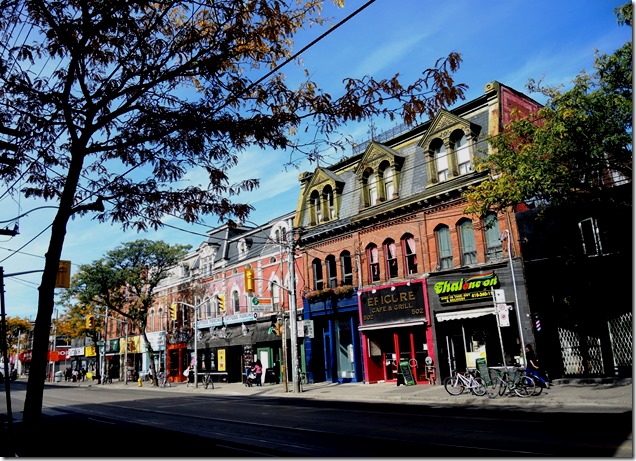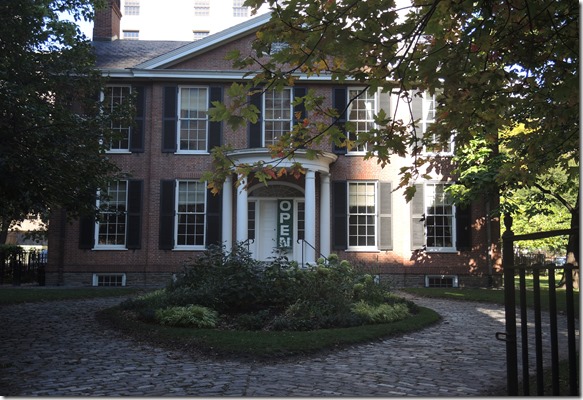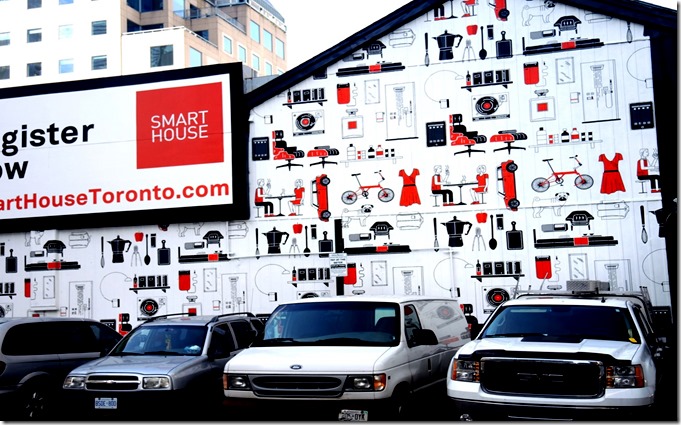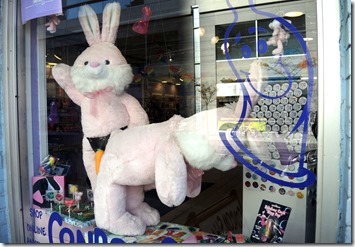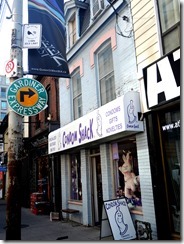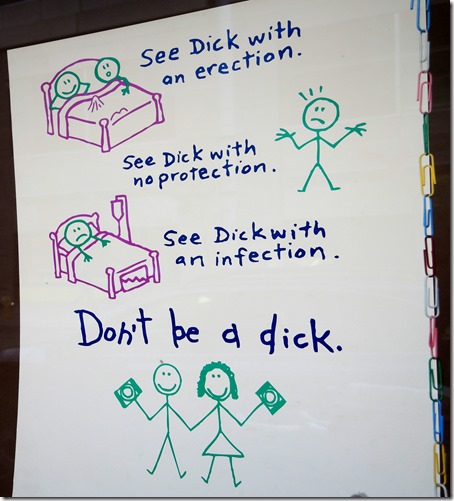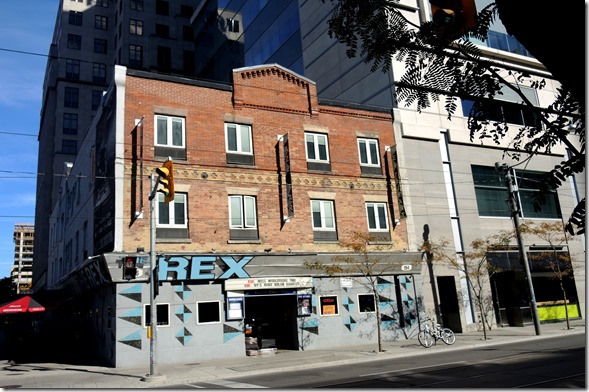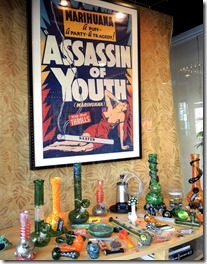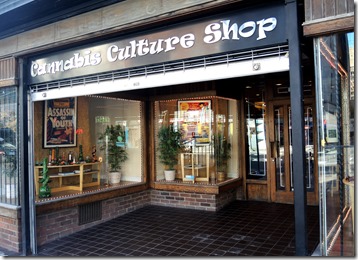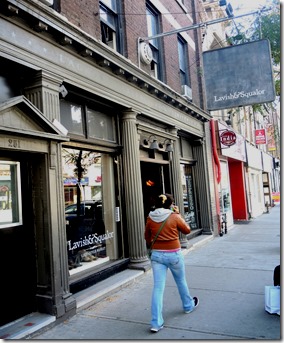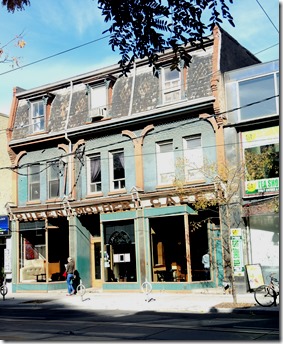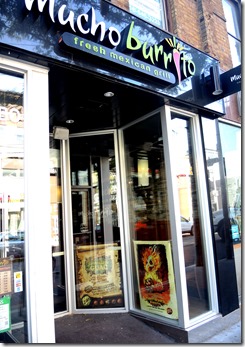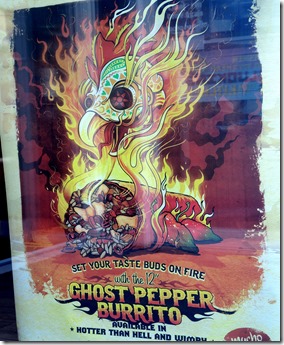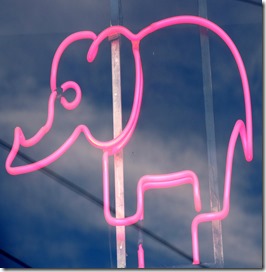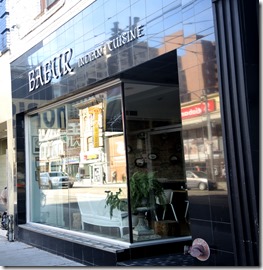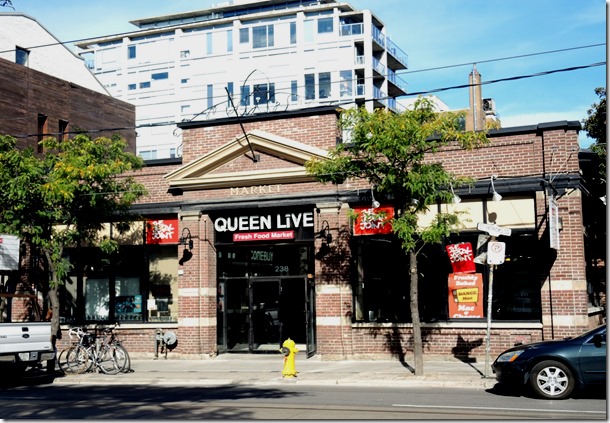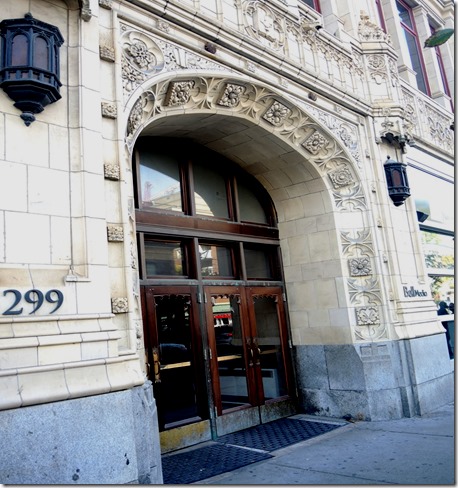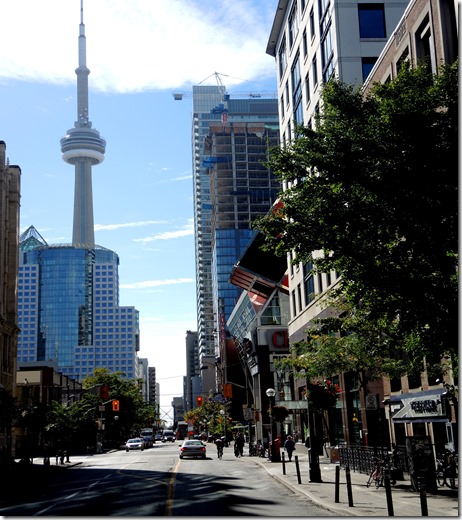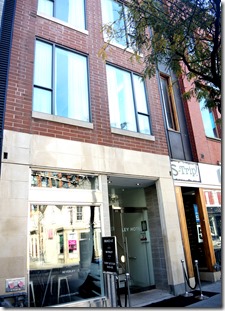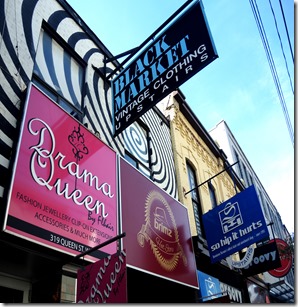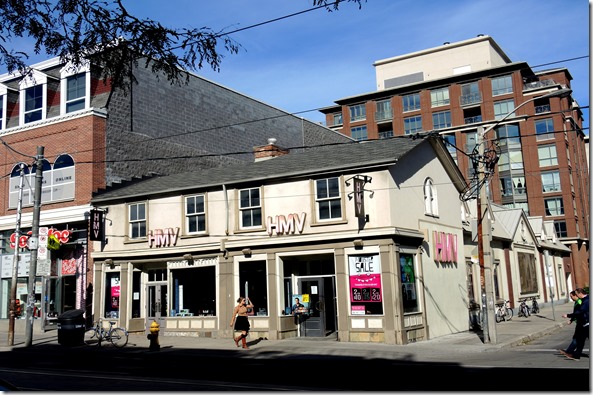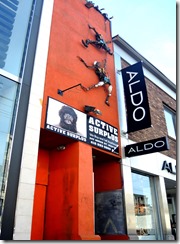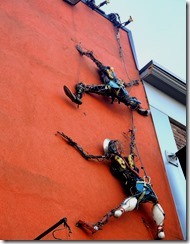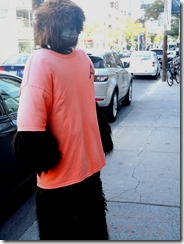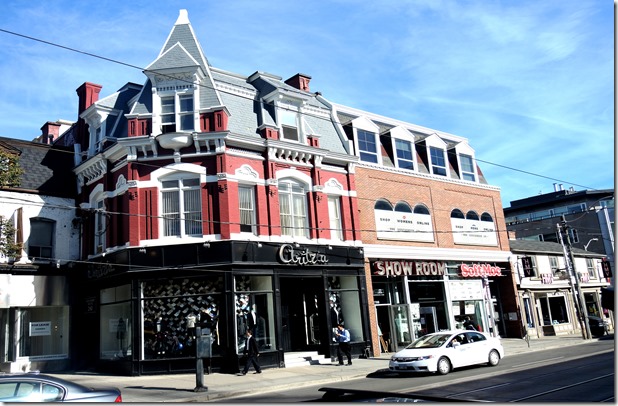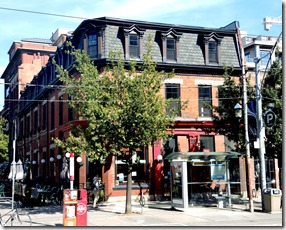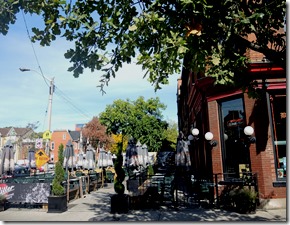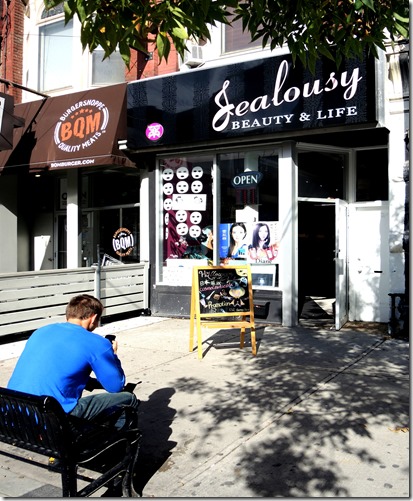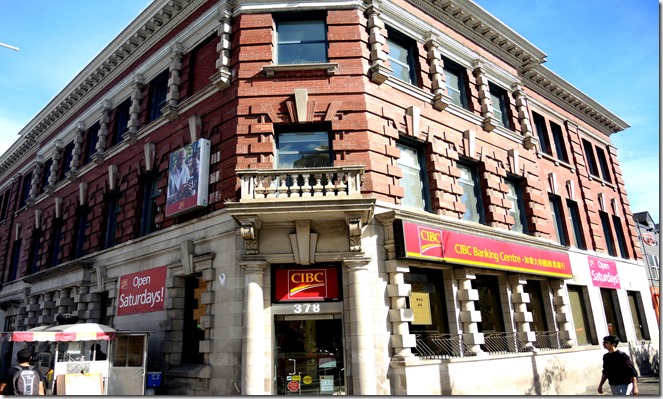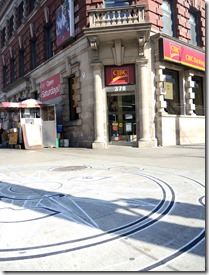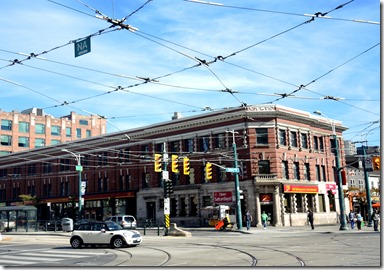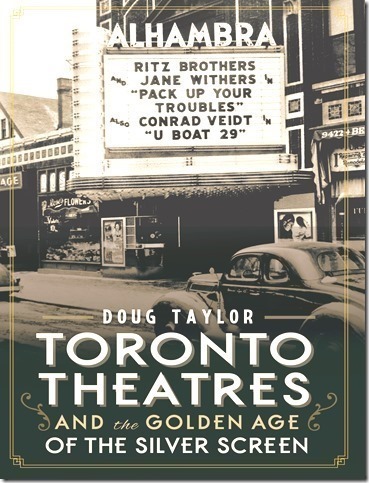The quote below was written by Christopher Hutsul in the Toronto Star on August 29, 2004.
Queen St., in effect is becoming one vast accidental urban success story. In richness and scale, there may be no better street in the world than our very own Queen Street.“I can’t think of another street that the vitality, the variety, and has the length and has the depth that Queen has from one end to the other,” says Dr. Mitchell Kosny of Ryerson’s School of Regional and Urban Planning. “It’s starting to fill in.”
It might seem bold to pit Queen Street against the world’s top strips but, in its way, it stacks up against the best of the best. Broadway in New York City starts out hot, then cools as it wends its way to Albany. Champs-Elysees in Paris is one of the world’s most famous streets, but it’s also a major thoroughfare. Highbrow visitors can enjoy the expensive restaurants and boutiques, but the average Parisian would head somewhere more accessible.
Admittedly, our humble Queen Street might have a tough time out-classing La Ramblas in Barcelona, which, with its stunning architecture and endless culinary offerings, is one of the greatest streets in the world. However, could it match Queen’s understated, New World charm?
Certainly Queen Street reigns over Yonge Street, which is often considered our flagship route. “I don’t see Yonge St. as having all that much continuity at all,’ says Kosny. “It doesn’t have anywhere the life and vitality that Queen St. has.” And while downtown has been busy evolving into a mini Times Square (as if that were something worth emulating), Queen St. has quietly grown out of its awkward years.
* * *
On Thursday, October 20, 2013, the weather was sunny with cloudless skies, the temperature in the mid 20s, a perfect Toronto autumn day. Walking along Queen Street West, I encountered delightfully naughty window displays, colourful street art, and a few puzzling sights. The following photos are a snapshot of the street between University and Spadina avenues, on the morning of October 3, 2013. In these photos, the street was relatively quiet as it was not yet 10 am.
Historic Campbell House is on the northwest corner of University Avenue and Queen Street. Built in 1822, it was the home of Chief Justice William Campbell. It was relocated from Adelaide Street East and Frederick Street in 1952. When this photo was taken, the morning sun was creeping across the east side of the house. Queen West is well known for being “hip,” but it is also rich with history. It contains some of the best 19th-century buildings in North America. Campbell House is open for public tours and is well worth a visit.
For a link to information on the history of Campbell House.
https://tayloronhistory.com/2012/04/16/enjoying-torontos-architectural-gems-campbell-house/
This colourful sight is on the east wall of a row of 1860s shops, a short distance west of Simcoe Street. Though it resembles a wall mural, it is an ad for a condominium.
The “Condom Shack,” a naughty shop that is the delight of tourists, is located in one of the 1860s shops. Elderly woman seem to take great delight in photographing the store, but usually remain on the far side of the street as they are too embarrassed to approach any closer. This is a pity, as they are unable to see the risqué sign in the east window (shown below).
The sign in the east window of the “Condom Shack.”
The Rex Hotel, one of the city’s most popular jazz venues since the 1950s, at Queen and St. Patrick’s Street. It opened in 1890 as the William’s Hotel.
The “Cannabis Culture Shop.” Marijuana has recently been in the news, but on Queen West it has been an integral part of the scene for several decades.
The “Lavish and Squalid” Shop on the south side of Queen, with its ornate classical store front (left photo), and the popular Queen Mother Cafe at 206-210 Queen on the north side of the street (right photo). The 1890s building where the Queen Mother Cafe is located was designed in the Second Empire style. When constructed in the 19th century it contained three shops—the grocery store of Charles Woolnough, the locksmith store of Benjamin Ibbotson, and the confectionary shop of Patterson and Wilson. The Queen Mother Cafe now occupies all three shops.
The sign in the window of “Mucho Burrito” advertises that its “Ghost Pepper Burrito” is available in “hotter than hell and whimpy.”
Some of the heat from the “Mucho Burrito” can also be found in the spicy food at 273 Queen, the “Babur Restaurant,” specializing in Indian cuisine.
The Queen Street Market is on the site of the old St. Patrick’s Market of 1836, the second farmers’ market established by the city after the St. Lawrence Market in 1803. The present-day building dates from 1912.
This is the doorway on the old Methodist Publishing House, built in 1913, on the southeast corner of Queen and John streets. It is the most impressive doorway on Queen St. West. The decorative detailing is achieved with terracotta tiles. Today the building houses Bell Media.
View looking south on John Street, from the middle of the intersection at Queen and John streets.
The ultra-chic Beverley Hotel, which opened on Queen West in 2013 (left-hand photo). The right-hand photo is of an assortment of signs on the 19th-century buildings nearby.
19th-century shops on the northwest corner of Beverley and Queen streets.
The “Active Surplus Shop” on the south side of Queen, west of Beverley St. It is a great place to purchase household items such as batteries, at bargain prices.
This wonderfully ornate building, located where the sidewalk widens to the west of it, was built in 1881 and was Mara’s Grocery and Liquor Store. Its facade was employed in the TV show “Street Legal,”as the offices of the fictional law firm. The show starred Cynthia Dale, .
The “Black Bull Tavern” at Queen and Soho streets was established in 1822. It’s patio was voted by the readers of a downtown newspaper at the most popular patio in the city.
The “Jealousy Beauty and Life Shop” and the BMQ Restaurant, both located in the 1888 Noble Block. The BQM specializes in gourmet burgers and has a sidewalk patio that is ideal for observing the Queen-Street scene.
The former Bank of Hamilton, built in 1902, now the CIBC.
The zodiac signs painted on the sidewalk in front of the entrance to the bank (left photo) and a view of the bank from the southwest corner of Queen and Spadina.
For a link to Part Two of this post, which contains a snapshot of Queen West between Spadina and Bathurst Street, on the morning of October 3, 2013:
https://tayloronhistory.com/2013/10/20/toronto-gemsqueen-st-westpart-twonaughty-and-nice/-com/
To view the Home Page for this blog: https://tayloronhistory.com/
To view other posts about the history of Toronto and its buildings:
https://tayloronhistory.com/2013/10/08/links-to-historic-architecture-of-torontotayloronhistory
To view previous blogs about movie houses of Toronto—old and new
https://tayloronhistory.com/2013/10/09/links-to-toronto-old-movie-housestayloronhistory-com/
Book published in 2014 about Toronto’s old movie theatres, which explores 50 of Toronto’s old theatres and contains over 80 archival photographs of the facades, marquees and interiors of the theatres. It also relates anecdotes and stories from those who experienced these grand old movie houses.
“Toronto’s Theatres and the Golden Age of the Silver Screen”
To place and order for this book, either in electronic or hard copy format, follow the link below.
Theatres Included in the Book
Chapter One – The Early Years—Nickelodeons and the First Theatres in Toronto
Theatorium (Red Mill) Theatre—Toronto’s First Movie Experience and First Permanent Movie Theatre, Auditorium (Avenue, PIckford), Colonial Theatre (the Bay), the Photodrome, Revue Theatre, Picture Palace (Royal George), Big Nickel (National, Rio), Madison Theatre (Midtown, Capri, Eden, Bloor Cinema, Bloor Street Hot Docs), Theatre Without a Name (Pastime, Prince Edward, Fox)
Chapter Two – The Great Movie Palaces – The End of the Nickelodeons
Loew’s Yonge Street (Elgin/Winter Garden), Shea’s Hippodrome, The Allen (Tivoli), Pantages (Imperial, Imperial Six, Ed Mirvish), Loew’s Uptown
Chapter Three – Smaller Theatres in the pre-1920s and 1920s
Oakwood, Broadway, Carlton on Parliament Street, Victory on Yonge Street (Embassy, Astor, Showcase, Federal, New Yorker, Panasonic), Allan’s Danforth (Century, Titania, Music Hall), Parkdale, Alhambra (Baronet, Eve), St. Clair, Standard (Strand, Victory, Golden Harvest), Palace, Bedford (Park), Hudson (Mount Pleasant), Belsize (Crest, Regent), Runnymede
Chapter Four – Theatres During the 1930s, the Great Depression
Grant ,Hollywood, Oriole (Cinema, International Cinema), Eglinton, Casino, Radio City, Paramount, Scarboro, Paradise (Eve’s Paradise), State (Bloordale), Colony, Bellevue (Lux, Elektra, Lido), Kingsway, Pylon (Royal, Golden Princess), Metro
Chapter Five – Theatres in the 1940s – The Second World War and the Post-War Years
University, Odeon Fairlawn, Vaughan, Odeon Danforth, Glendale, Odeon Hyland, Nortown, Willow, Downtown, Odeon Carlton, Donlands, Biltmore, Odeon Humber, Town Cinema
Chapter Six – The 1950s Theatres
Savoy (Coronet), Westwood
Chapter Seven – Cineplex and Multi-screen Complexes
Cineplex Eaton Centre, Cineplex Odeon Varsity, Scotiabank Cineplex, Dundas Square Cineplex, The Bell Lightbox (TIFF)
